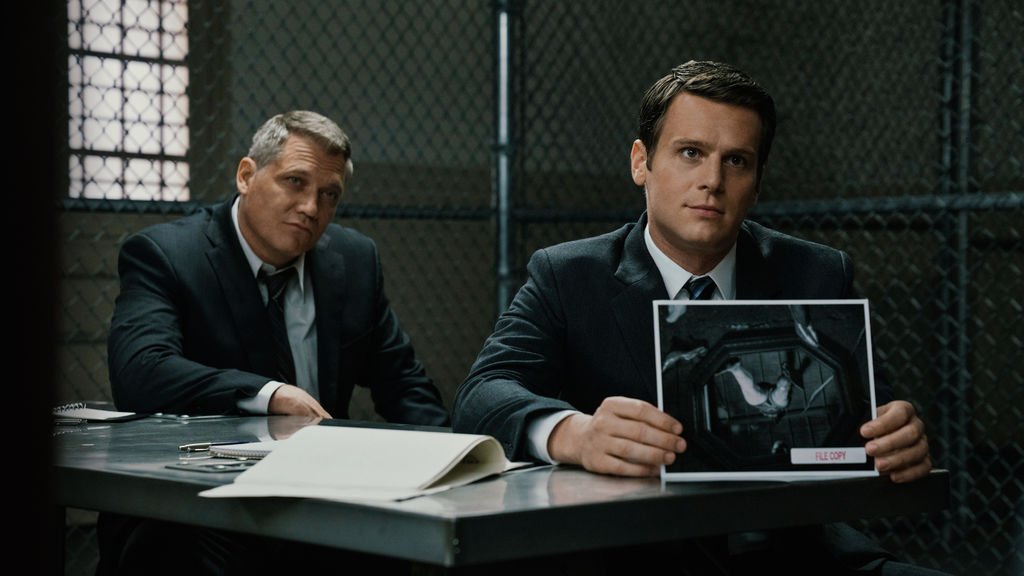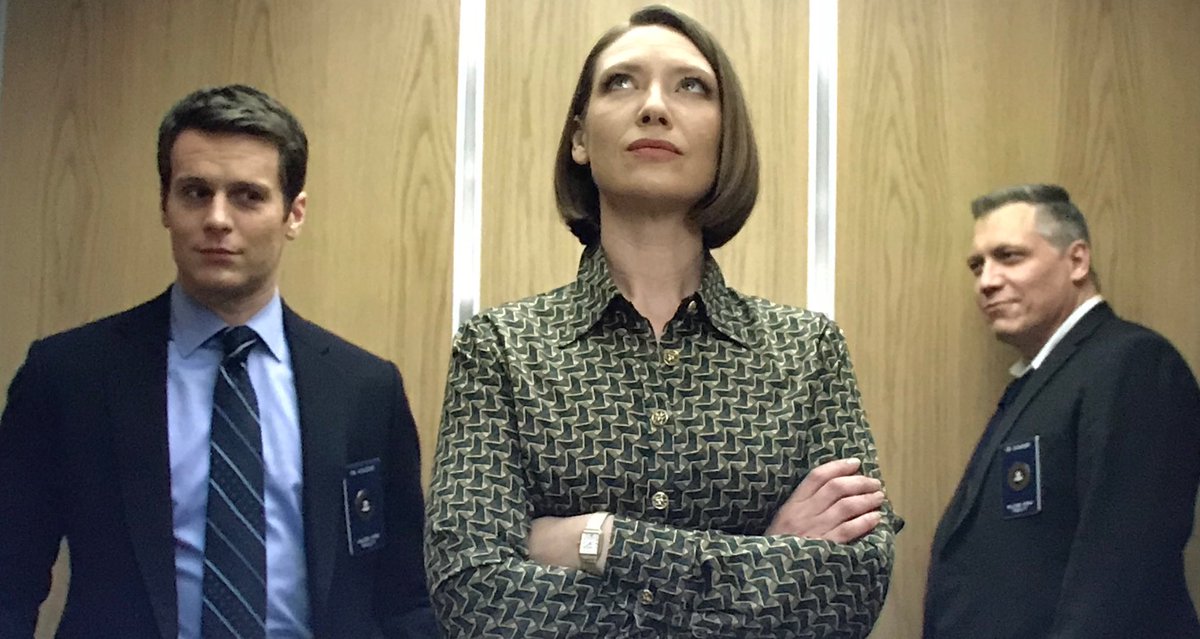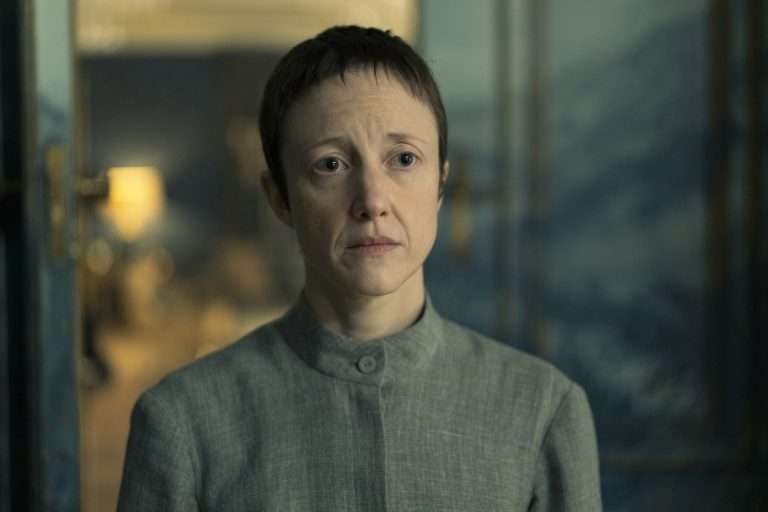Mindhunter (2017-) – an engrossing crime drama series on the phenomenon of serial murder
David Fincher’s penchant for attaching himself to projects about dreary ‘whydunit’ mysteries and relentlessly obsessive, misunderstood male protagonist continues with the recent, highly anticipated Netflix crime series Mindhunter (2017-). Fincher’s crime thrillers (Se7en, Zodiac, The Girl with the Dragon Tattoo, and Gone Girl) are often more compelling than the majority of garden-variety thrillers because of its deep social and psychological context. I think Mr. David Fincher and Mr. Denis Villeneuve are the best contemporary American film-makers who are adept at turning the dial on a scene without resorting to cheap violence or emotions. From trailers and other promos, you may have heard what Mindhunter is about: FBI agents trying to understand the appalling new type of killers with obscure motives, who cropped up in the late 1960s and 1970s America (the murderers were not even called by that term in those times) and who were then perceived as exotic, monstrous creatures. And as promised, the show is more about figuring out the cryptic mind of serial-killers, and in the process gets pulled deep into their existential void, similar to unbearably tense procedural like Dexter, True Detective, The Fall, etc.
Mindhunter is written by English-Australian playwright Joe Penhall, based on John E. Douglas & Mark Olashker’s 1995 non-fiction true crime book of the same name. Mr. John was said to be one of the early criminal profilers in US, whose reasonably sharp methods of psychological profiling is said to have indirectly spawned the dangerously imaginative villains in cinematic and literary fiction. Since it’s an adaptation of a non-fiction material that covers sprawling series of crimes, subtle bureaucratic conflicts, and multi-dimensional personal problems of those involved, the writing isn’t always even and many of the ambiguous narrative threads are just hanged upon to harvest its impact in the later seasons. Its intentional arrhythmical proceedings definitely causes some frustration and the writing in mid-episodes lacks momentum or sense of urgency, but the consistently engaging performances and plenty of Fincher-esque moments (combined with wealth of production values) incites the binge-watching obsession.
Similar Read to Mindhunter: 5 Screenwriting Lessons You Can Learn From The Breaking Bad Pilot
The first season of Mindhunter is set between mid and late 1970s – the grisly era of serial-killers in US soil – as the FBI is struggling to comprehend the depravity of the new series of murders. Twenty nine year old Holden Ford (Jonathan Groff) is an experienced and determined Hostage negotiator in FBI who after a distasteful incident feels the old method of catching killers or negotiating with unhinged criminals doesn’t apply anymore. Apart from on-field work, he teaches a class on the dos and don’ts of hostage negotiation. One day, he overhears a criminal psychologist’s intriguing class on the new wave of gruesome murderers (the nation hasn’t yet recovered from the deviant crimes of Charles Manson and Son of Sam) whose crimes doesn’t seem to have any concrete motive. Ford wonders how the FBI would stop these cruel crimes without addressing the ‘why?’. While the criminal psychological profiling attempts have grown manifold in the last four decades, the ‘why’ still remains elusive at times (very recently we were left to grimly contemplate on the shocking deaths of Las Vegas concert goers – on Oct. 1, 2017).
Despite his strategic thinking and unbridled motivation, Ford is utterly tactless when it comes to convincing the bureau’s veteran agents on the need to refresh crime-solving techniques. Ford’s radical thinking is shunned by the agency that’s still inclined to blot out profane words while teaching its recruits about deviant crimes. Ford’s theoretical thinking gains practical ground when he is paired up with veteran agent Bill Tench (Holt McCallany). Bill and Ford travel across United States, teaching cops different methodologies to nab perpetrators. When traveling around California, Ford gets the idea of talking to a crazy murderer and question him about his background and motives. Bill, who doesn’t call upon bureau hierarchy to belittle Ford, reluctantly drops off Ford to meet the convicted 6 feet 5 inch tall serial killer Edmund Kemper (Cameron Britton). Labeled as ‘Co-ed Killer’, Kemper between 1964 and 1973 was found guilty of 10 counts of murder. Kemper kidnapped and brutally killed six young women, in and around Santa Cruz. He also killed his mother and confessed to practicing necrophilia with victims’ corpses after severing the head from the body. Despite the physically intimidating stature and nature of his crimes, Kemper moves and talks like a gentle giant. Kemper calmly recollects about his lonely childhood, adolescence and his abusive mother. He mentions the act of dismembering the victims as an ‘vocation’ or ‘oeuvre’. Unnerved by the monstrous killer’s bizarre choice of words, Bill later growls at Ford: “His oeuvre? What the fuck, he’s Stanley Kubrick?”
Despite Ford’s unwavering interest to delve into the world of serial killers, he initially maintains a healthy (sexual) relationship with his girlfriend Debbie (Hannah Gross). Debbie isn’t the regular on-screen girlfriend whose purpose often doesn’t extend beyond sexual intimacy and adoration for her male partner. With a no-nonsense attitude, Debbie keeps Ford’s burgeoning arrogance and obsession at check, and teaches him a lot about sex and women. Their intense, mutually-pleasuring sexual encounters contrasts the other lengthy, messed up sexual attitudes shown by the killers, interviewed at prison by Ford and Tench. Holden’s ever-mutating relationship with Debbie is also interlinked with his escalating curiosity for convicted serial killers (Ford’s incongruous friendship with Kemper is one of the unsettling notes). When news reaches the bureaucratic circle on the importance of gleaning psychological insights from these distinct category of killers, the bureau receives an enormous fund from government organizations. Ford and Tench are set up at Quantico’s basement and operate under the name of newly formed department: Behavioral Science Unit. The two-man team also ropes in Dr. Wendy Carr (Anna Torv), a brilliant psychologist and a closeted lesbian, who gets increasingly baffled by Ford’s uncanny methods to interview serial-killer and by his unlawful application of freshly developed insights in the current crime scenarios.
Mindhunter definitely treads on an original path, eschewing elements of a tailor-made procedural, to truly comprehend the novelty of serial killer. It’s still early to decide upon its place among the pantheon of great crime TV series, since the unique perspective has its share of fascinating moments and annoying flaws. Apart from the edgy, spine-tingling conversations between Ford and serial killers (Edmund Kemper, Monte Rissell, Jerry Brudos, and Richard Speck), the insights about the administrative hand-wringing with in FBI proves to be the series’ most compelling scenes. Series creator Joe Penhall and writer Jennifer Haley, in spite of the show’s formlessness and digressive vignettes, addresses the difficult set of phases related to recognizing the new breed of killers, gathering psychological truths, and implementation of the gained truths on the current crime-solving procedure. Although Ford, Tench and Dr. Carr gain new ground in understanding serial-killing, each of the freshly popping crimes intriguingly questions their methods and results. Ford’s hazy judgment on the foot-tickling school principal and the episode involving the brutal killing of small-town girl depicts the complex, difficult nature of evaluating the deviant behavior and making general public (jury members) or decision-makers to understand it. But still there are quite a few least interesting elements in the show which is thought to provide some deep character perception, while grossly failing at it.
Torv’s Dr. Carr character, who ought to be the series’ third-lead, is so under-written that her personal life is constricted to a fleeting episode at Boston and insipid interplay with some tuna cans. While the character sketch of Gross’ Debbie is initially interesting, her mood swings and reactions in later episodes settle into the familiar trajectory. Eventually Debbie’s allegedly ‘offensive’ attitudes are used simply as a sounding board to make Ford display his jealous and reticent behavior. Dr. Wendy Carr’s character trajectory may hopefully develop in the further seasons, but there’s not much hope for Debbie. The other seemingly pointless aspect is the little episode-opening scenes about real-life serial killer Dennis Rader aka BTK killer (or at least it’s based on him). On the directorial perspective, the first two episodes delights us with marvelous Fincher-esque moments: the meticulously rhythmic insert montages that exhibits the Ford and Tench’s routine activities through dimly-lit airlines, motel rooms, and classes; blood-chilling tense interrogation of elusive perpetrators and convicted killers; and as I mentioned earlier, Holden Ford is the perfect Fincher protagonist – the obsessive guy who enjoys pursuing things outside the social norms. Performance wise, Jonathan Groff and McCallany’s inter-plays are the most enjoyable. From being intentionally awkward to deliberately offensive, Groff is a fine fit to play Ford. Cameron Britton who plays Kemper offers the scene-stealing performance of the show. Talking about his repulsion towards women in an icy calm voice, Britton accurately brings the real serial-life killer to life (the video interviews of Kemper are available online and you should watch it if you are in a mood to get perturbed). His banter provides the series’ most impressive exchanges amongst the otherwise overly theatrical dialogues.
Mindhunter (2017-) addresses the question of why we are fascinated by serial killers, while at the same time it shows our reluctance or ineptitude to truly understand those disquieted individuals and the societal muck that breeds them. Despite certain flaws in form and characterization, the series is at its most captivating when it probes deep into the stark, extremely twisted mindset of serial-killers.
★★★★
Serial Killers in ‘Mindhunter’ — News Week






![Doubt [2008]: A Crisis of Faith Leads to a Dissection of the Nature of Certainty](https://79468c92.delivery.rocketcdn.me/wp-content/uploads/2022/03/Doubt-Essay-768x432.jpg)

![Citizenfour [2014] Review: Paranoia-Inducing Edward Snowden Revelations](https://79468c92.delivery.rocketcdn.me/wp-content/uploads/2019/02/Citizenfour_HOF-768x420.jpg)


![A Death in the Gunj [2017]: An Intricate Character Study](https://79468c92.delivery.rocketcdn.me/wp-content/uploads/2017/04/death_in_gunj_gallery_7-768x402.jpg)